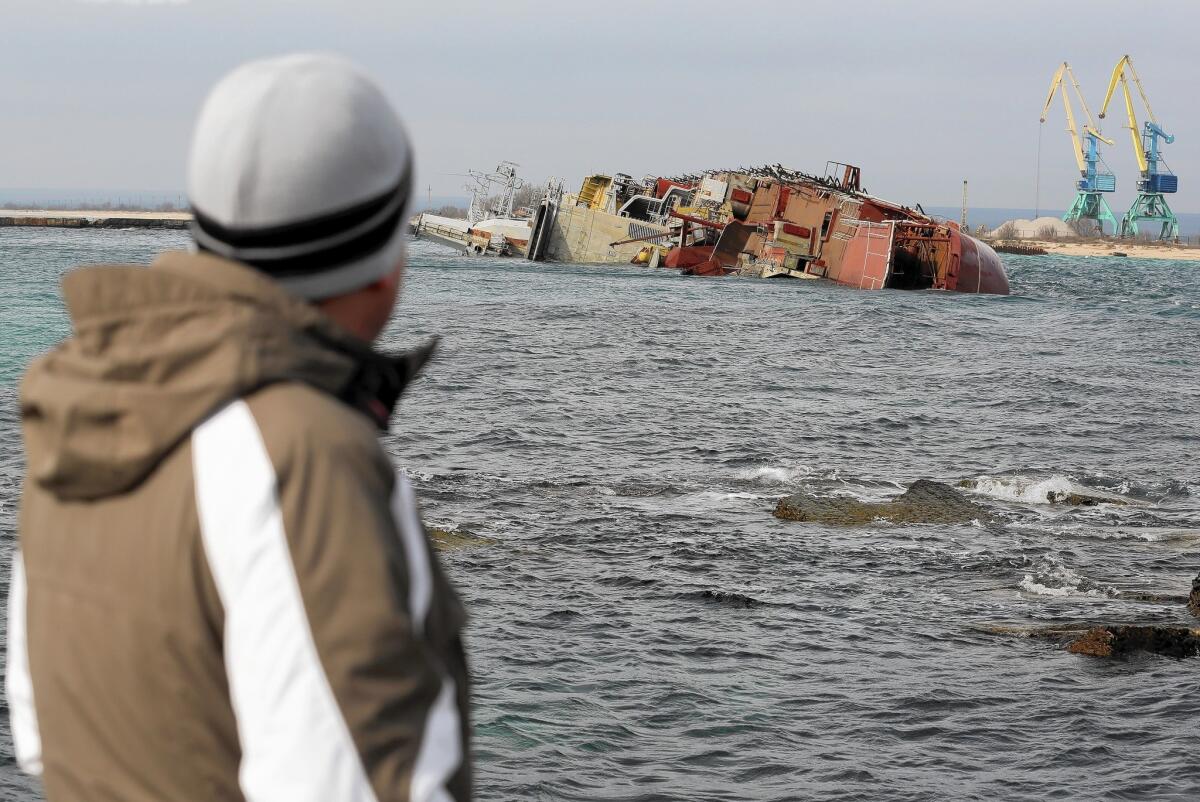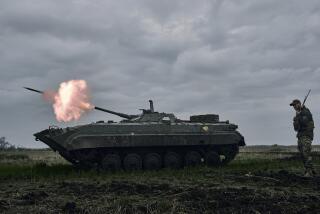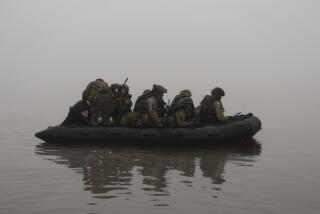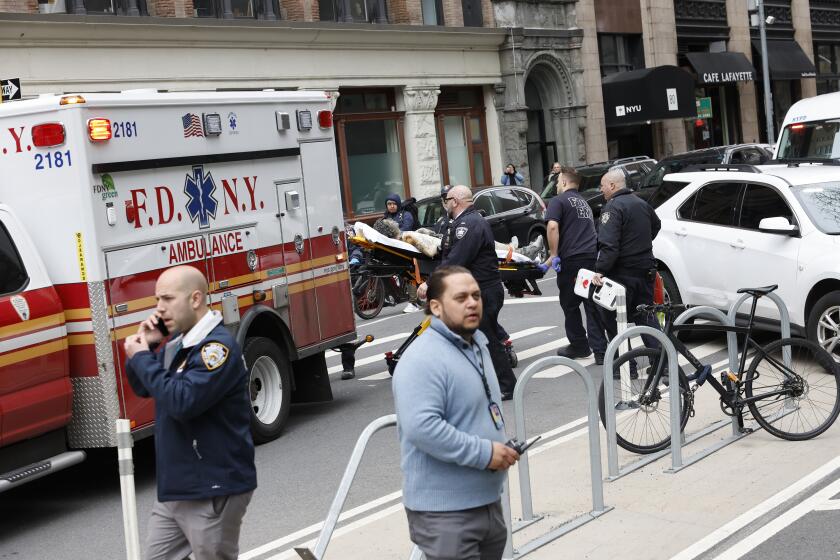Crimea lawmakers schedule secession referendum

KIEV, Ukraine — Rebellious ethnic Russians in Ukraine’s Crimea region raised the stakes Thursday in the so-far bloodless battle for control of the strategic peninsula when regional lawmakers voted unanimously in favor of secession and moved to put the issue before voters in 10 days.
Officials in Washington, Kiev and other European cities, where a flurry of diplomacy was underway, denounced the secession bid as unconstitutional and thus meaningless.
But with thousands of Kremlin troops in control of Crimea’s military, government and commercial operations, the legalistic protests appeared unlikely to persuade the peninsula’s Moscow-backed Russian-speaking majority to back down from its refusal to be ruled by the government in Kiev, the Ukrainian capital.
Russian troops in Crimea lifted part of their days-long blockade of Ukrainian military sites Thursday, although it was unclear whether the move was a display of confidence that they had the peninsula firmly under control or an effort by the Kremlin to begin a quiet, strategic retreat in the face of international outrage.
“Wednesday late at night the Russian paratroopers that deployed all over our base suddenly packed and went away,” said Lt. Col. Oleksandr Lomako, deputy commander of Ukraine’s antiaircraft regiment stationed in Yevpatoria, about 60 miles north of Sevastopol. “But when leaving, their commander said that they will be back.”
Lomako’s officers retrieved stored weapons and rearmed their men. “The Russians captured our base and disarmed us only because they took us by surprise and because we didn’t want to start a big war by armed resistance,” he said. “Should they reappear again and attack us we will use every means at our disposal including firearms to defend our base.”
The Russians also lifted their blockade of at least two other Ukrainian bases in the cities of Bakhchisaray and Novoozernoye, though they continued to surround other sites, including the naval headquarters in Sevastopol. Russian forces sank one of their own old anti-submarine ships in a Black Sea bay, in effect trapping Ukrainian naval vessels stationed at Novoozernoye.
The 87-0 vote by the regional legislature to cleave Crimea from Ukraine and annex it to Russia was announced by the region’s first deputy prime minister, Rustam Temirgaliev, Russia’s Itar-Tass news agency reported. The referendum on the peninsula’s future, originally planned for month’s end, was moved up in an apparent bid to spur momentum for secession while Russian forces were still controlling the parliament and setting the agenda in Crimea. Nearly 60% of the peninsula’s 2 million people are ethnic Russians.
Ukraine’s National Security and Defense Council called an emergency session to respond to the Crimean action, the Ukraine Crisis Media Center reported.
Crimea has become the focal point of Russia’s political challenge to Ukraine’s new leadership, which has filled the power vacuum created when Moscow’s ally, President Viktor Yanukovich, fled Kiev last month after months of antigovernment protests. Russian President Vladimir Putin has denounced the leadership change in Kiev as an illegitimate and unconstitutional coup d’etat.
In Moscow, lawmaker Sergei Mironov on Thursday introduced a measure to simplify Crimea’s joining Russia and predicted it would pass as early as next week, Itar-Tass reported.
Any territorial embrace of renegade Crimea by Russia would surely amplify the worldwide outcry over the armed intervention, even though high-level Moscow officials have portrayed the Crimean uprising as a local development over which they have no influence.
Putin has been defiant in his defense of the military incursion, which began last week, and the prospects for a widening deployment of Russian soldiers, saying there’s a need to protect ethnic Russians and strategic Kremlin interests. Russia’s Black Sea fleet leases facilities in Crimea.
Interim Ukrainian Prime Minister Arseny Yatsenyuk and other senior officials on Thursday attended an emergency meeting of European Union leaders on the Ukraine crisis.
“This so-called referendum has no legal grounds,” Yatsenyuk told reporters in Brussels. “Crimea was, is, and will be an integral part of Ukraine.”
A Ukrainian military spokesman called the measure a sign of desperation on the part of Russian-speaking Crimeans.
“The illegitimate moves of the Crimean parliament working under the control of the Russian troops indicate that they are really desperate to hold the so-called referendum as soon as possible while the Russian occupying force is still here,” said Lt. Col. Alexei Mazepa, a regional spokesman for Ukraine’s Defense Ministry. “Each new day of Russian military presence here makes it more and more difficult to explain to the world what [Russia’s] armed soldiers are doing in a sovereign foreign country.”
As the face-off intensified, the White House criticized the referendum and said it was ordering a restriction on visas for Ukrainian and Russian officials threatening “the peace, security, stability, sovereignty or territorial integrity of Ukraine.” The administration also called for financial sanctions against anyone found to have misappropriated Ukrainian state property or abused the power of their offices, an apparent reference to Yanukovich and others driven from power last month.
The White House also said that President Obama spoke with Putin on Thursday afternoon and emphasized that “Russia’s actions are in violation of Ukraine’s sovereignty and territorial integrity.” Obama indicated that a diplomatic resolution to the situation could include direct talks between the governments of Ukraine and Russia and the return of Russian forces to their bases, a statement said.
At the EU meeting in Brussels, the bloc reiterated its demand that Russia withdraw from Crimea and called off talks on a trade pact with Moscow, though the European leaders split along geographic lines over further sanctions. The former Soviet bloc allies closest to Russia’s borders sought harsher action than did Germany and other states with strong trade with Russia and more to lose.
The North Atlantic Treaty Organization also has suspended meetings and joint missions with Russia in reaction to the Ukraine incursion. NATO has canceled plans for a Russian escort of the U.S. vessel involved in dismantling Syria’s chemical weapons at sea, and regular contacts between the Western alliance and Russian diplomats in Brussels have been suspended.
On a visit Thursday to Kiev, the head of the EU delegation to Ukraine said the Crime referendum violates Article 73 of the Ukrainian Constitution, which sets out conditions for revising borders and territory.
Secretary of State John F. Kerry made the same point after meetings in Rome with officials, including those from Russia and Ukraine.
“Crimea is Ukrainian,” Kerry said, pointing out that the Ukrainian Constitution requires a countrywide vote on any changes to the status of national territory.
Times staff writers Sergei L. Loiko in Yevpatoria, Ukraine, Henry Chu in London and Lisa Mascaro in Washington contributed to this report.
More to Read
Start your day right
Sign up for Essential California for news, features and recommendations from the L.A. Times and beyond in your inbox six days a week.
You may occasionally receive promotional content from the Los Angeles Times.






